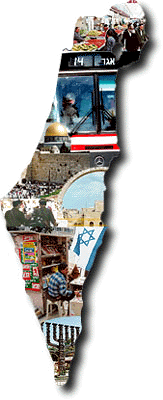Parshat Vayikra
Overview
The Book of Vayikra (Leviticus), also known as Torat Kohanim -- the Laws of the Priests -- deals largely with the korbanot (offerings) brought in the Mishkan (Tent of Meeting). The first group of offerings is called korban olah, a burnt offering. The animal is brought to the Mishkan's entrance. For cattle, the one bringing the offering sets his hands on the animal. Afterwards it is slaughtered and the kohen sprinkles its blood on the altar. The animal is skinned and cut into pieces. The pieces are arranged, washed and burned on the altar. A similar process is described involving burnt offerings of other animals and birds. The various meal offerings are described. Part of the meal offering is burned on the altar, and the remaining part is eaten by the kohanim. Mixing leaven or honey into the offerings is prohibited. The peace offering, part of which is burnt on the altar and part is eaten, can be either from cattle, sheep or goats. The Torah prohibits eating blood or chelev (certain fats in animals). The offerings that atone for inadvertent sins committed by the kohen gadol, by the entire community, by the prince and by the average citizen are detailed. Laws of the guilt-offering, which atones for certain verbal transgressions and for transgressing laws of ritual purity, are listed. The meal offering for those who cannot afford the normal guilt offering, the offering to atone for misusing sanctified property, laws of the "questionable guilt" offering, and offerings for dishonesty are detailed
Insights
A LITTLE IS A LOT
"A satisfying aroma to Hashem." (1:9)
The Rema in his gloss to the Shulchan Aruch says that when a person drinks on Purim, he doesn't need to enter a binge that will leave him with fuzzy edges for days afterwards. Quite the reverse: "It is the same whether one does much or whether one does a little, provided the intention of his heart is for our Father who is in Heaven."
There is an interesting parallel to this idea in this week's Parsha: When a person brings an elevation offering, he may bring either cattle, sheep, birds or fine flour. After each of these categories, the Torah uses the phrase "a satisfying aroma to Hashem." Obviously, cattle are more expensive than sheep, which are more expensive than fowl, which are more expensive than flour. If the Torah wanted to tell us that G-d views all these offerings equally, wouldn't it have been enough to say that fine flour is "a satisfying aroma," and we would make the logical inference that fowl, sheep and cattle are certainly "a satisfying aroma?"
The answer is that, had the Torah left this lesson to a fortiori logic, we might have mistakenly assumed that fine flour is "satisfying" and fowl all the more so; sheep are yet more acceptable, and cattle, most of all.
Thus, the Torah writes after each category "a satisfying aroma" to teach that whether our offerings are large or small, G-d looks at them absolutely equally provided our intentions are for the sake of Heaven.
"It is the same whether one does much or whether one does a little, provided the intention of his heart is for our Father who is in Heaven"
Heard from Rabbi Mordechai Perlman
Parshat Zachor
NOT BY CHANCE
The first of the four special Parshiot, Shekalim, contained the formula for the correction of the negative trait of jealousy. According to the Sages, the Parsha of Zachor contains within it the corrective for physical lust.
The whole world had witnessed the revelation of G-d's power in Egypt and at the splitting of the sea, but there was one nation who was still not convinced -- Amalek. Amalek somehow was able to put everything down to "chance." Its attack on Israel was in essence an attack on G-d.
When a person strays after his base desires, the problem begins in the mind. It is this easy-come-easy-go attitude which leads a person to sin. If there is no Divine justice, no reward and no punishment, then why not sin? This is the Amalek attitude. It is this false philosophy that we correct with the reading of Parshat Zachor.
 Selections from classical Torah sources which express the special relationship between the People of Israel and Eretz Yisrael VALLEY OF AYALON (EMEK AYALON) This is where Yehoshua and the Israelite army defeated a consortium of five Emorite armies in a battle in which two miracles took place. "Hashem rained down great stones from heaven upon themůmore died from these hailstones than did from the swords of the Children of Israel." (Yehoshua 10:11) But then came an ever greater miracle. The sun was setting as Yehoshua pursued his fleeing enemies, so he commanded the sun to halt. Never before or after did Heaven fulfill such a request by demonstrating that "Hashem wages war for Israel." (ibid. 12-14) The Valley of Ayalon also witnessed the battles of the Maccabees, the Romans, Arabs, Crusaders, and the British in World War One. Nearby Latrun was the scene of heavy fighting in the 1948 War of Independence. After the war, the settlement of Mishmar Ayalon was established in a deserted Arab village on a hill overlooking the valley. |






